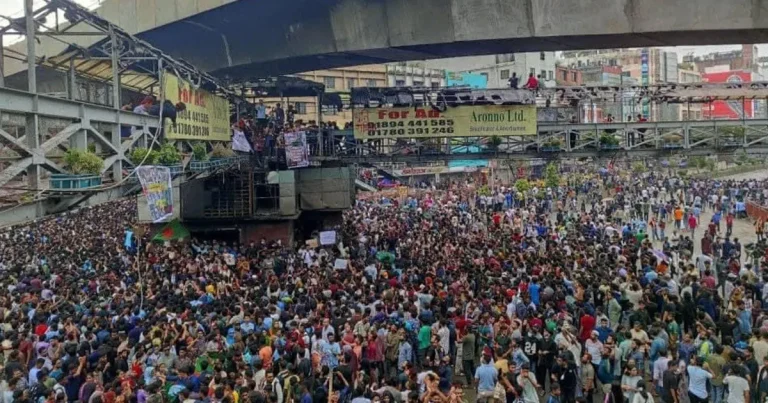5-8-2024 (DHAKA) At least 91 people, including 13 police officers, were killed and hundreds more injured in violent clashes that erupted across Bangladesh on August 4. The unprecedented bloodshed occurred as police resorted to firing tear gas and rubber bullets to disperse tens of thousands of protesters demanding the resignation of Prime Minister Sheikh Hasina.
The staggering death toll, the highest for a single day of protests in Bangladesh’s recent history, surpassed the 67 fatalities reported on July 19 when students took to the streets demanding the scrapping of quotas for government jobs. The gravity of the situation prompted the government to declare an indefinite nationwide curfew starting at 6 p.m. (1200 GMT) on August 4, the first such measure taken during the current wave of protests that began last month. Additionally, a three-day general holiday has been announced, beginning Monday.
The unrest, which has led to the government shutting down internet services, represents Hasina’s most formidable challenge during her 20-year regime, having secured a fourth consecutive term in elections boycotted by the main opposition Bangladesh Nationalist Party. Critics and human rights groups have accused Hasina’s government of using excessive force against protesters, an allegation vehemently denied by her and her ministers.
On August 4, demonstrators took to the streets, blocking major highways as student protesters launched a non-cooperation program to intensify pressure on the government to step down. The violence quickly spread nationwide, with police stations and ruling party offices targeted by the enraged crowds.
In a defiant address following a national security panel meeting attended by top military and law enforcement officials, Hasina denounced the perpetrators of violence as “terrorists” intent on destabilizing the nation. “I appeal to our countrymen to suppress these terrorists with a strong hand,” she declared.
The northern district of Sirajganj witnessed some of the most brutal clashes, with 13 police officers beaten to death and two lawmakers’ homes set ablaze. Nine others lost their lives in the same district. In the capital, Dhaka, at least 11 people, including two students and a ruling party leader, were killed, and dozens more were injured amid fierce confrontations, according to police and witnesses.
India’s foreign ministry has urged its nationals to avoid travel to Bangladesh until further notice, underscoring the gravity of the situation.
The violence extended far beyond the capital, with reports of casualties pouring in from various districts. In Munsiganj, two construction workers were killed, and 30 others were injured during a three-way clash involving protesters, police, and ruling party activists. Witnesses reported that the victims were brought to the hospital with bullet wounds, although police denied firing live ammunition.
In Pabna, three people were killed, and 50 others were injured in clashes between protesters and activists of Hasina’s Awami League party. The districts of Feni, Lakshmipur, Narsingdi, Rangpur, and Magura also reported multiple fatalities, with the death toll continuing to rise.
The violence even targeted healthcare facilities, with a group vandalizing a medical college hospital in Dhaka and setting fire to vehicles, including an ambulance. Health Minister Samanta Lal Sen condemned the attack, stating, “An attack on a hospital is unacceptable.”
At least four garment factories were set ablaze in Ashulia, on the outskirts of Dhaka, further exacerbating the chaos and disruption.
In an unprecedented move, the government ordered telecom providers to shut down 4G internet services, effectively disabling high-speed internet access nationwide. Social media platforms like Facebook and WhatsApp were also rendered inaccessible, even via broadband connections, according to a confidential government memo obtained by Reuters.
The memo, issued by the National Telecommunication Monitoring Center, a government intelligence agency, instructed telecoms providers to “shut down all your 4G services until further notice, only 2G will be effective.” Telecoms companies were previously warned that their licenses could be revoked if they failed to comply with government orders.
Last month, at least 150 people were killed, and thousands were injured in violence sparked by student groups protesting against quotas for government jobs. While the protests initially paused after the Supreme Court scrapped most quotas, students returned to the streets in sporadic demonstrations last week, demanding justice for the families of those killed.
Shakil Ahmed, an associate professor of government and politics at Jahangirnagar University, expressed concern over the escalating crisis, stating, “I think the genie is out of the bottle, and Hasina may not put it back in the bottle again.”
In a significant development, the Chief of Army Staff, General Waker-Uz-Zaman, directed his officers on August 3 to ensure the security of people’s lives, properties, and crucial state installations under all circumstances. He emphasized that the Bangladesh Army is a symbol of the people’s trust and will always be there for the interests of the nation and its citizens.




